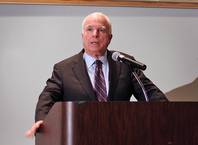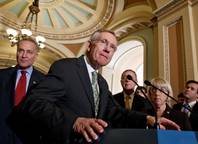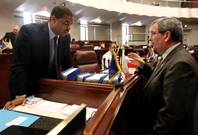Wednesday, Nov. 7, 2012 | 2 a.m.
A looming election gave the most partisanly divided Congress in history the perfect excuse to table challenging but critical pieces of legislation.
That excuse is gone. And though the powers of Washington, D.C., are as politically divided as they were 24 hours ago, lawmakers now have no choice but to hunker down and find a way to work through their differences.
The clock is ticking. Once Congress gets back to Washington, there are about seven weeks left in the 112th to compel compromise and complete legislation on a broad spectrum of issues before all their efforts so far expire.
It’s unlikely the lame duck session will address anything sweeping or visionary, such as new immigration, education or energy policy — though much-needed overhauls of each may well be on the agenda for the next congressional session.
What’s before Congress now are the necessary basics — issues that, if left unresolved, could force the country to brace itself for some pretty steep consequences in the new year.
Here’s a look at the top five issues facing lawmakers when they return to Washington.
-

1. Fiscal cliff
For almost two years, the end of 2012 has been portended to be fiscal doomsday.
Absent any action by Congress, payroll tax cuts and reduced income tax rates expire at the end of December. And thanks to a debt ceiling deal Congress struck last summer, that’s also when across-the-board cuts are supposed to kick in for the Defense Department and several other federal agencies.
Congressional budget analysts have predicted the combination of a tax spike and a spending slash will be a shock that sends the economy over the “fiscal cliff,” possibly resulting in a second recession.
Despite the evocative imagery, the drop-off point may actually feel more like a midgrade slope, and the plateau that leads to it longer than expected, thanks to Congress having passed a six-month budget extension that carries the country through the end of March. But to avoid shrinking the economy at the expense of balancing the federal budget, Congress is going to have to come up with some combination of changes to federal spending and taxes.
-

2. Tax extenders
Congress may be pushing the country toward the fiscal cliff, but for many Americans, the end of the year is a hard-and-fast deadline for their own personal income tax cliffs.
The “tax extenders” package is an annual hurdle Congress must clear in the waning days of the session, but this year, the hurdle is a bit higher than usual. Several tax breaks aimed at the middle class expired at the end of 2011.
It’s up to Congress to decide whether to extend them. The package includes fixing the Alternative Minimum Tax so it applies only to the wealthy; continuing the Mortgage Forgiveness Tax Deduction, crucial for underwater homeowners who have struck deals with their banks; and the sales tax deduction, an important deduction for Nevadans have no state income tax to deduct from their federal bill.
-

3. Appropriations
Republicans have had more fun than Count von Count tallying the days they say it has been since Congress passed a budget. That’s not exactly true, since Congress has struck several deals to keep government spending going in the thousand-plus days since Republicans started their count.
Those deals haven’t been easy. The budget has been strung along through a series of debt ceiling deals and continuing resolutions — bills that keep the money flowing but don’t allow the members of Congress to really take a close item-by-item look at where dollars should be spent.
Lawmakers haven’t undertaken that painstaking budget process since entering this post-earmark era of unprecedented budget crises and cuts.
But the confluence of fiscal imperatives won’t be what pushes Congress to take a magnifying glass to its budget in the new year. The need for the president to set a fresh tone for the next four years will.
-

4. Cybersecurity
Experts in both parties agree that the nation’s vulnerability to a cyberattack poses the biggest national security threat to America, more than any war, any dirty bomb or any strategic cut to defense spending.
But for months, lawmakers’ attempts to build urgency around the issue has been all but buried by the attention surrounding the election. Part of that is because lawmakers conducted much of the process in secret, in deference to the fact that cybersecurity planning is a complex, clandestine government activity.
But it’s also something that potentially affects the privacy of every Internet user. Public concern about their rights online and push-back from the business community have helped to stymie any progress.
Still, growing dependency on the virtual grid has precipitated a sharp rise in recorded cyberattacks — and Congress is running out of time to implement a strategy to stave off a strike.
-

5. Online poker
No Nevada list would be complete without a nod to the No. 1 niche legislative issue on the state’s agenda.
But this year, it’s not just lip service.
A change in the government’s interpretation of the Wire Act at the end of 2011 opened the market for online gaming development to everyone but sports betting operations — creating the potential for a free for all that could severely undercut Nevada’s dominant share of this market. Since then, almost 20 states, including Nevada, have started developing legal Internet gaming industries, from lotteries to table games.
Only the wary eye of Congress — which still has the ability to roll back the Wire Act reading — has kept the dam from fully breaking.
But other states’ patience won’t last long. Unless Republicans and Democrats can come together to pass a bill rendering all forms of online gambling except for poker illegal, Nevada-based companies should brace themselves for more competition than they have ever experienced.






Join the Discussion:
Check this out for a full explanation of our conversion to the LiveFyre commenting system and instructions on how to sign up for an account.
Full comments policy